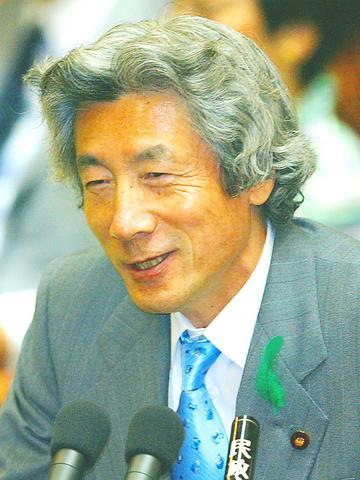Japan's Prime Minister Junichiro Koizumi marked his third anniversary in office yesterday boosted by firm public support and a clean sweep for his ruling party in weekend by-elections.
"My policy of `no reform, no recovery' does not waver," Koizumi said in parliament after his Liberal Democratic Party (LDP) won all three seats contested in Sunday's ballots in the run-up to national polls in July.
"I am now convinced my reform policy was right," he said, arguing curbs on fiscal spending by the government had led to signs of emerging recovery by the Japanese economy.

PHOTO: APN
"I want to make these bright signs spread to regional cities and smaller companies [from major cities and giant corporations] by stepping up reforms," he said.
A weekend telephone poll of 1,000 adults by the TV Tokyo private network revealed strong support for Koizumi among voters.
About 53 percent of those questioned backed the premier, down from the sky-high 81 percent immediately after he took office but up from 45 percent after his first year in office.
Analysts have said the Koizumi administration escaped political disaster when five Japanese civilians taken hostage in Iraq this month were released unharmed.
Koizumi had refused the demands of Iraqi militants who had threatened to kill three of the hostages unless Tokyo withdrew its 550 soldiers in Iraq.
Although two of the three by-elections had been expected to be close, the LDP was spared a voter backlash either for sending troops to Iraq or for an ongoing battle over pension reform.
Instead the conservative party dealt a blow to the main opposition Democratic Party of Japan (DPJ) by holding onto all three seats in what were effectively two-way contests.
Chief Cabinet Secretary Yasuo Fukuda told reporters that "the results were very good for the ruling coalition."
In the Saitama constituency, just north of Tokyo, a first-time LDP candidate won with 45 percent of the votes cast, defeating a career politician from the DPJ by a margin of 5 percent.
The Saitama seat was considered the left-of-center opposition's best chance to draw blood as it had been vacated by an LDP lawmaker who stepped down in January following a vote-buying scandal last year.
In Hiroshima, western Japan, the ruling party was returned with 51 percent of the votes, while in Kagoshima, southern Japan, always a safe bet as an LDP stronghold, the ruling party cruised to victory with an 83 percent majority.
Voting was marked by record-low turnout in all three constituencies, at around 55 percent for Hiroshima and Kagoshima and 35 percent for Saitama.
The by-elections came just three months before July's nationwide poll for half the seats in the upper house.
Shigenori Okazaki, political analyst at UBS Securities Japan, said the clean sweep, helped by low turnout and votes mobilized by coalition partner New Komei party backed by lay Buddhists, augured well for the ruling party in the July polls.

Asian perspectives of the US have shifted from a country once perceived as a force of “moral legitimacy” to something akin to “a landlord seeking rent,” Singaporean Minister for Defence Ng Eng Hen (黃永宏) said on the sidelines of an international security meeting. Ng said in a round-table discussion at the Munich Security Conference in Germany that assumptions undertaken in the years after the end of World War II have fundamentally changed. One example is that from the time of former US president John F. Kennedy’s inaugural address more than 60 years ago, the image of the US was of a country

BLIND COST CUTTING: A DOGE push to lay off 2,000 energy department workers resulted in hundreds of staff at a nuclear security agency being fired — then ‘unfired’ US President Donald Trump’s administration has halted the firings of hundreds of federal employees who were tasked with working on the nation’s nuclear weapons programs, in an about-face that has left workers confused and experts cautioning that the Department of Government Efficiency’s (DOGE’s) blind cost cutting would put communities at risk. Three US officials who spoke to The Associated Press said up to 350 employees at the National Nuclear Security Administration (NNSA) were abruptly laid off late on Thursday, with some losing access to e-mail before they’d learned they were fired, only to try to enter their offices on Friday morning

Cook Islands officials yesterday said they had discussed seabed minerals research with China as the small Pacific island mulls deep-sea mining of its waters. The self-governing country of 17,000 people — a former colony of close partner New Zealand — has licensed three companies to explore the seabed for nodules rich in metals such as nickel and cobalt, which are used in electric vehicle (EV) batteries. Despite issuing the five-year exploration licenses in 2022, the Cook Islands government said it would not decide whether to harvest the potato-sized nodules until it has assessed environmental and other impacts. Cook Islands Prime Minister Mark Brown

STEADFAST DART: The six-week exercise, which involves about 10,000 troops from nine nations, focuses on rapid deployment scenarios and multidomain operations NATO is testing its ability to rapidly deploy across eastern Europe — without direct US assistance — as Washington shifts its approach toward European defense and the war in Ukraine. The six-week Steadfast Dart 2025 exercises across Bulgaria, Romania and Greece are taking place as Russia’s invasion of Ukraine approaches the three-year mark. They involve about 10,000 troops from nine nations and represent the largest NATO operation planned this year. The US absence from the exercises comes as European nations scramble to build greater military self-sufficiency over their concerns about the commitment of US President Donald Trump’s administration to common defense and